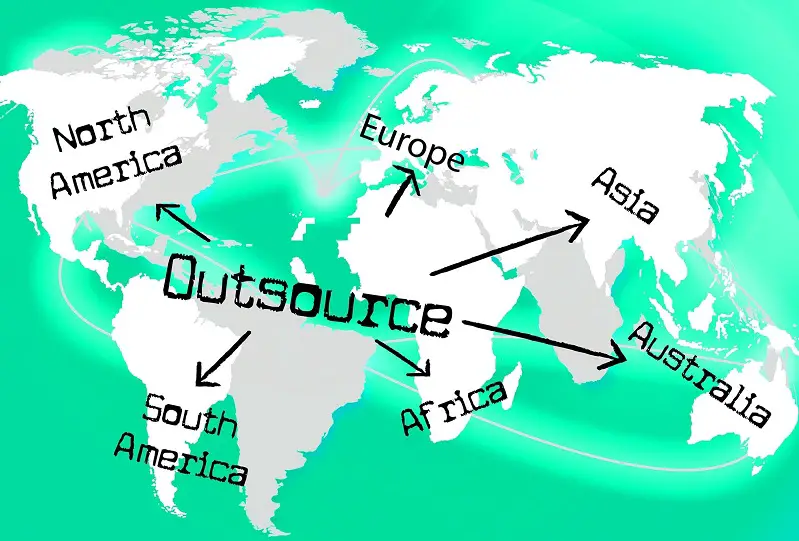When it comes to business, there are a lot of important decisions to make. One of the most critical is deciding whether to outsource or offshore work. Both outsourcing and offshoring have pros and cons, but which option is right for your company? This article will explore the key differences between outsourcing and offshoring so you can decide which option is best for your business. Let’s get started.
What is Outsourcing?
Outsourcing is contracting with a third party to handle work that can be done internally. This usually occurs when a company does not have the resources or expertise to complete a certain task. For example, if a company wants to launch a new product but does not have the in-house resources, it may outsource the project to a third party.
What is Offshoring?
Offshoring is similar to outsourcing but specifically refers to contracting with a company in another country. This often occurs when businesses want to take advantage of lower labor costs in other countries. For example, a company can hire offshore staff to handle customer service or data entry. It can do this to reduce its operating costs or get more skilled labor than is available domestically.
Similarities Between Outsourcing and Offshoring
There are a few key similarities between outsourcing and offshoring. They are both key tips to stay on top of your business finances. First, both involve contracting with a third party to complete work that can be done internally. A company will outsource or offshore work when it does not have the resources or expertise to complete the task. Second, both outsourcing and offshoring can be used to reduce labor costs. When done correctly, contracting with a third-party company can save a business money on labor.
It is, however, important for the company to vet the third-party company carefully to ensure that it is reputable and will provide quality work. Otherwise, the company may spend more money on the project than it would have if it had completed the work internally.
Key Differences Between Outsourcing and Offshoring
There are many differences between outsourcing and offshoring, and they mostly center around location, cost, quality, and control.
Location
Outsourcing can occur domestically or internationally, but offshoring always refers to working with a company in another country. This means that a company will go beyond its borders to find the best talent or to reduce costs. For instance, a company may outsource its manufacturing to China or India to take advantage of lower labor costs.
Cost
Outsourcing and offshoring can save a company money, but offshoring usually results in more significant cost savings. This is because labor costs are typically lower in other countries. When companies offshore, they often do so to reduce their operating costs.
Quality
The quality of work from an outsourcing or offshore company can vary greatly. This is because there is often a language barrier and cultural differences. That said if a company takes the time to find a reputable and qualified firm, the quality of work can be very high. Both processes are meant to help a company save money without sacrificing quality.
Control
When a company outsources or does offshore work, it gives up some control. This is because the company relies on another company to complete a task. While this can be a risk, it can also lead to better results as the third-party company may have more expertise.
Now that you understand the key differences between outsourcing and offshoring, you can decide which option is best for your company. Outsourcing may be the way to go if you need help with a specific project. However, offshoring may be a better option if you’re looking to reduce costs. Whichever route you choose, be sure to do your research to find a reputable and qualified company.
Tips to Consider When Offshoring
When done correctly, offshoring can save your company a lot of money. But there are a few things to keep in mind to ensure success. Here are a few tips:
- Define Your Goals: Before you start looking for an offshore company, you need to define your goals. What do you hope to accomplish by offshoring? This will help you find the right company that can meet your needs.
- Do Your Research: Not all offshore companies are created equal. You need to do your research to find a reputable and qualified firm. Otherwise, you may end up spending more money than you saved.
- Create a Contract: Once you’ve found a company you want to work with, be sure to create a contract. This will help protect your company’s interests and ensure both parties understand the project’s scope.
- Communicate: Because offshoring involves working with a company in another country, communication is key. Be sure to establish clear lines of communication from the start.
Tips to Consider When Outsourcing
Outsourcing can be a great way to get help with a specific project. But there are a few things to keep in mind to ensure success. Here are a few tips:
- Define Your Goals: Just like with offshoring, you need to define your goals before you start looking for a company to outsource to. What do you hope to accomplish by outsourcing? This will help you find the right firm for the job.
- Do Your Research: Not all outsourcing companies are created equal. You need to do your research to find a reputable and qualified company. Otherwise, you may end up spending more money than you saved.
- Create a Contract: Once you’ve found a company you want to work with, be sure to create a contract. This will help protect your interests and ensure both parties understand the project’s scope.
- Communicate: Because outsourcing involves working with another company, communication is key. Be sure to establish clear lines of communication from the start.

Can I Outsource and Offshore Simultaneously?
Yes, you can outsource and offshore at the same time. In fact, many companies do this to save even more money. However, there are a few things to keep in mind. First, you need to be clear about your goals. Second, you need to find reputable and qualified firms to work with. Finally, you need to establish clear lines of communication. If you do all of this, you can successfully outsource and offshore simultaneously.
Offshoring and outsourcing are two great ways to save money without sacrificing quality. Both processes have their own advantages and disadvantages, so be sure to do your research to decide which one is right for your company. Whichever route you choose, be sure to establish clear goals, find a reputable firm to work with, and establish clear lines of communication. With these tips in mind, you’re sure to save money and improve your business.




